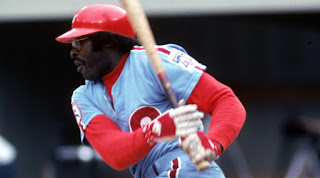Dick Allen: Integrating Philadelphia’s Baseball Culture
Much of what has hurt Dick Allen in reaching the Hall of Fame has been his reputation in the press of creating racial divisions on the teams for which he played. This is a reputation that has been perpetuated unfairly. To the contrary, Allen has been caught in a world where American society in general, and baseball in particular, has had to come to grips with racial discrimination. While white America preferred to sweep the problem of racial discrimination under the rug, players such as Allen were outspoken, refusing to let the issue be covered up. It is his outspokenness, when many Americans preferred to turn a blind eye to societal ills, that handicapped Allen’s chances of being inducted into the Hall, and which to this day haunts his candidacy.
Some have called Allen Philadelphia’s Jackie Robinson. And rightly so. Allen’s career was marred by racial discrimination by fans in Philadelphia. His endurance of this mistreatment, while acting as one of the greatest power hitters of his era, is the reason Allen deserves specialist recognition.
Philadelphia was not known as a particular hospitable city for African-Americans integrating into the major leagues. Philadelphia was the last National League team to integrate in 1957. It was accomplished with very little fanfare in the press, perpetuating the impression that Northern whites preferred to ignore or downplay the problem of racism in America. Even with integration, the Phillies signed an African-American named Jack Kennedy, who was used primarily as a pinch-runner. His tenure with the Phillies was brief.
In 1947, when Robinson played his first season with the Dodgers, it was the Phillies Manager Ben Chapman who taunted Robinson mercilessly on the field. It was Philadelphia’s Benjamin Franklin Hotel that refused the Dodgers service because of Robinson’s presence. It was with this background that Allen signed with the Phillies.
Allen also perceived that his voice was being stifled by the Phillies organization. It began with the name the Phillies and the Philadelphia media initially used for Allen: Richie. Allen went by the name Dick. He considered Richie a boy’s name, and resented its use despite his protestations.
The situation was exacerbated by the 1965 incident with Frank Thomas. Thomas stoked the flames of racism by calling Allen “boy” in Los Angeles, and commenting that Allen should be carrying his bags. During batting practice, when a teammate (whether Allen or Johnny Callison is unclear) criticized Thomas for his bunting abilities, Thomas responded by comparing Allen to “Mohammed Clay,” a reference to outspoken heavyweight boxer Mohammed Ali. It was a reference to which Allen took offense, and prompted a scuffle between Thomas and Allen where Allen was hit by a bat.
After the incident, Thomas was released, but Allen was forbidden to discuss his side with the press. This prompted many Philadelphia fans to blame Allen for the incident, and show they displeasure with boos and throwing objects at Allen. Feeling robbed of his voice, Allen resented the organization and the fans, pleading to be traded.
Once Allen found his voice, it should be no surprise that he used it to support fellow minority players in the major leagues. By this time, it was the tumultuous 1970s, when America in general was addressing its racial divides and history of discrimination. The conflict over how to address racial discrimination played out in the ballpark as well, as African-American baseball pioneers like Jackie Robinson, for examples, pressed for African-American managers, which were conspicuously absent from the clubhouse.
And this controversy followed the now outspoken Allen. On one hand, Bill James has argued, “[Allen] did more to keep his teams from winning than anyone else who ever played major league baseball.” By contrast, fellow Phillies player Mike Schmidt has asserted that any talk that Allen divided a clubhouse was an outright lie.
During Allen’s second tenure with the Phillies, he came into conflict with Manager Danny Ozark over Ozark’s personnel choices. Allen perceived that white players, such as Jerry Martin and Jay Johnstone, were being favored for playing time over African-American players, such as Bobby Tolan and Ollie Brown.
An incident which brought the racial divide within the Phillies to the forefront took place after the Phillies clinched the National League East by winning the first game of a double-header in Montreal in 1976. Initially, Allen remained on the bench in the dug-out as his teammates celebrated in the locker room between games. Later, Allen, Dave Cash, Gary Maddox and Mike Schmidt went to a clubhouse broom closet to celebrate the victory. Allen has stated that he simply toasted the Phillies victory. Maddox claimed that the teammates said a prayer in thanksgiving for the NL East title. Known as the “Broom Closet Incident,” it became a divisive factor for the Phillies leading into the National League Championship Series.
It had been assumed that with the NL East title under their belt, the second game of the double header would be played by bench players and September call-ups, as the game had no meaning. Ollie Brown had made his way to the dug-out bench, expecting to start. Meanwhile, Phillies starters were slow to return to the dug-out, much to the consternation of Ozark, who had a game to manage. Fanning the flames of racial tensions, Ozark decided to start Martin over Brown.
In a later team meeting, Tug McGraw expressed that he felt that the white guys were wondering where the black guys had gone. Maddox replied that while the team seemed unified all season, it was now coming out that the unity may have merely been a front, as his teammates’ true feelings were now being expressed. He lamented on whether he had made a mistake to sign with the team for multiple years. Allen, who was not with the team for the final series in St. Louis, meanwhile campaigned for Tony Taylor to be on the play-off roster in recognition for his years of contributions to the Phillies. It was a campaign Ozark resented, as he wanted no interference in his choices for the play-off roster.
On the field, the result was a sweep by the Cincinnati Reds in the 1976 NLCS. Off the field, the Phillies informed Alien that he would not be re-signed to the team for the 1977 season.
Focusing on Allen for the 1976 controversy, however, is not fair. America as a whole was dealing with years of racial prejudice and what that meant for society. Baseball was merely a microcosm of that conflict. Underlying racial tensions on the Phillies were not caused by Allen. Nor was he the only member of the team to feel those tensions. Allen may have been outspoken about his perception of alleged racist choices by Danny Ozark. But he was not the only one to speak out. In the end, Ozark was simply not the right manager for the team, as it took the appointment of Dallas Green to finally bring the Phillies to the promised land in 1980.
Allen’s contribution to the sport, in the face of changing attitudes in the country as a whole, call for his induction in the Hall of Fame as a pioneer in fully integrating baseball.



Thank you, Bill!
ReplyDeleteI’m happy you enjoyed it. Are you a Dick Allen fan?
Delete